The 3rd Asia-Pacific CBR Congress
Improving Accessibility and Assistive Technology (Wheelchairs)
through Partnership with Private Sector
Yukiko KUMAZAWA
Wheelchairs and Friendship Center of Asia (Thailand)
Introduction: Wheelchairs and Friendship Center of Asia (WAFCA) was established in 1999 as the social contribution project for DENSO Corporation (DENSO), an auto parts supplier with headquarters based in Aichi, Japan. We aim to support people with disabilities to have access to appropriate assistive devices, including wheelchairs. We also seek to contribute to creating accessible environments for people with disabilities. Our projects are implemented through overseas branches located in Thailand (WAFCAT) since 1999 and in Indonesia (WAFCAI) since 2014. In China, we also collaborate with social welfare organizations and DENSO Group Companies in China to produce and distribute wheelchairs since 2006. DENSO continues providing financial support to WAFCA and its projects providing for continuous efforts to create a barrier-free society for people with disabilities and for all.
Method: WAFCA projects started in Thailand in 1999 by supporting a wheelchair factory “Thai Wheel,” managed by the Thai with Disability Foundation (TDF). DENSO and WAFCAT provide staff training and technical support for wheelchair production. As well, WAFCAT donates wheelchairs made by Thai Wheel to rural-area children with disabilities in need of wheelchairs but cannot afford one without assistance. Since 2003, WAFCAT also started an Education Support Project by supporting scholarships, environmental adaptations in the school and home, and capacity-development training and education for students with disabilities, their teachers and family members. Recently, this project focuses on improving the quality of wheelchair services based on WHO and CBR guidelines. This project aims to provide appropriate wheelchairs, user education, repair and other training for local personnel on wheelchair provision. This is funded by the Thai DENSO Group Companies and implemented in cooperation with partner NGOs and the Thai Government, such as the Bureau of Special Education Administration under the Ministry of Education, and the Sirindhorn National Medical Rehabilitation Center under the Ministry of Public Health.
In China, WAFCA signed an agreement with Beijing Shuho, a public company, in 2006 and began supporting them to manufacture wheelchairs. WAFCA annually purchased 200 wheelchairs from Beijing Shuho for donation to people with disabilities through many local organizations mainly in Tianjin. While this partnership with Beijing Shuho ended in 2012, since then WAFCA continues building relationships with local people with disabilities by annually supporting 40 wheelchairs and scholarships given directly to students with disabilities in the Yunnan Province.
In Indonesia, WAFCA established a local foundation in cooperation with PT DENSO Indonesia and UCP Wheels for Humanity (UCPRUK), a NGO based in Yogyakarta. WAFCAI provides wheelchairs that fit individuals by following the provision steps developed by UCPRUK, including clinical and social assessment, assembly, fitting, adjustment, user training, follow-up and maintenance. Currently, mobile services are provided in communities mainly located in West Java and at the “Wheelchair Service Center” attached to the WAFCAI Office in Jakarta. In the near future, WAFCAI plans to expand its target areas to provide more wheelchairs through networking with service providers in communities trained by WAFCAI and UCPRUK.
Results: Over the last 16 years, WAFCA has provided people with disabilities more than 3,000 wheelchairs, 2,000 scholarships, 100 accessible toilets at schools and homes, and a variety of seminars and training mostly in Thailand and China. Since its establishment in Indonesia, WAFCA has provided more than 60 wheelchairs and 5 accessible toilets for schools with special needs education in Bekasi Province funded by the Grassroots Grant Project (GGP), under the Ministry of Foreign Affairs of Japan.
To measure the changes as a result of our projects, a survey was conducted in Thailand focusing on wheelchair recipients in 2014. The results showed clear positive changes after utilizing a wheelchair. The recipients could sit for a longer time (76%) and move more freely (71%) resulting in better feelings and emotions (83%) and reducing the burden on parents and caretakers (78%) when compared with before having a wheelchair. These are the direct changes by using wheelchairs. But unfortunately, very few recipients had indirect changes, such as going to school by a wheelchair. Clearly, there is a need for extra support to remove the many barriers that only wheelchairs cannot solve. In addition, more than 50% of the recipients were unable to access any maintenance and repair services. How to provide the necessary maintenance services in remote areas is the next challenge in Thailand.
A Case in Thailand: In 2007, Sutin Kesorn was 6 years old and in the first grade of elementary school in a small village in Nongbualamphu Province, located in the Northeast of Thailand. He was living with his single mother with no mobility devices despite the fact he couldn’t walk. WAFCAT provided a wheelchair, scholarship and barrier-free toilet at his school to ensure that he could continue attending school.
Although Sutin received all the equipment and scholarship, he and his mother thought to give up school many times because of their financial situation. WAFCAT invited Sutin, his mother and teacher to our capacity-development camp with other disabled students from many different provinces. We discussed repeatedly about the importance of education to get a job, and become independent in the future. We called the camp, the “Dream and Friendship Camp.” Sutin participated in the camp almost every year and encouraged him to continue studying at middle school in 2013. This year in 2015, Sutin is now in the 9th grade and he plans to continue on to high school next year. Sutin and his mother never gave up, which positively changed the attitudes of his friends, teachers, neighbors, and local government officers (who supported him with a tricycle later) towards people with disabilities. They all have created a support network for his life at school and in the community.
A Case in Indonesia: Aditya Acmad Priandini, or Adit, is an 18-year-old boy living with his parents and sister located in Bekasi Province, West Java in Indonesia. Adit was diagnosed with cerebral palsy and hyper active disorder. Despite his age, Adit is still in the elementary class of a special needs education school. Before, Adit never had access to mobility devices for his entire life. He usually spent most of his time at home crawling on the floor on his hands to move from one location to another. It was extremely difficult for Adit and his family members to go outside and of course to go to school.
In August 2014, WAFCAI made the first survey at his school and supported 4 manual wheelchairs and a barrier-free toilet with a sliding door and ramp installed at his school. After that, WAFCAI also discovered that Adit would need a wheelchair at home. WAFCAI’s clinical staff assessed his body and sitting posture to select the right size and type of wheelchair for him. Social workers also interviewed him and his parents to collect personal information and check their needs in regard to using a wheelchair. Today, Adit has an active wheelchair with user training so he can pedal the wheelchair by himself. His parents bring him to school everyday by motorcycle which helps Adit get basic academic skills. Now, Adit enjoys school very much and he has many friends. WAFCAI plans to follow up with him and his wheelchair and provide necessary maintenance or replacement next year.
Conclusion: WAFCA aims to achieve that all people with disabilities and their family members can have access to basic mobility devices, technology, and information. We hope to see them use an appropriate wheelchair to go outside, meet friends, study at school, be employed at a job and work, and actively participate in their community. It is clear that mobility devices are essential for people with disabilities but these are only tools. How we use these tools is more important than just having them and doing nothing. The CBR approach, therefore, can be very effective for wheelchair service providers because it helps people with disabilities to make a positive change in attitudes toward disabilities, and take full advantage of benefits from wheelchairs. It’s not easy and it will take time. But one wheelchair can make a difference when it’s provided and used as it is intended to be.
WAFCA will continue our grassroots efforts to achieve our mission and goals in sustainable development for people with disabilities in Thailand and Indonesia with the support from DENSO Group Companies in each country. In China, WAFCA will maintain the current relationship with the local organizations and supporters, and seek any chances to expand activities. For the future, WAFCA plans to continue expanding our reach to other ASEAN nations where DENSO is already established in doing business such as in Vietnam, the Philippines, Malaysia, and Cambodia.
Slide 1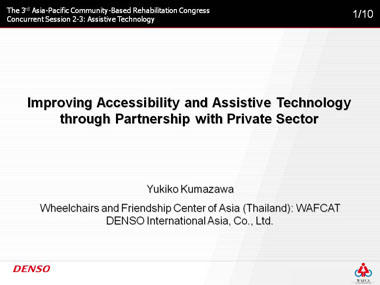 (Slide 1 text)
(Slide 1 text)
Slide 2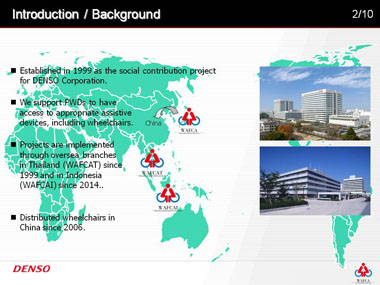 (Slide 2 text)
(Slide 2 text)
Slide 3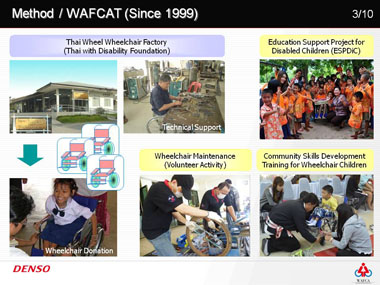 (Slide 3 text)
(Slide 3 text)
Slide 4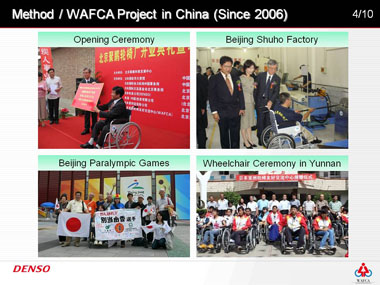 (Slide 4 text)
(Slide 4 text)
Slide 5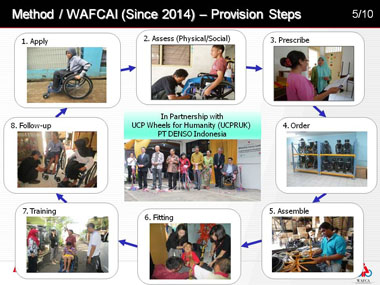 (Slide 5 text)
(Slide 5 text)
Slide 6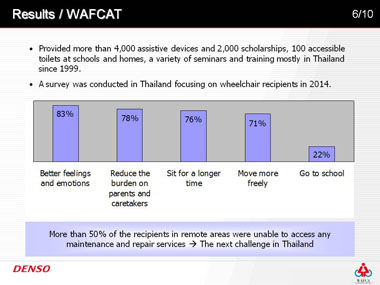 (Slide 6 text)
(Slide 6 text)
Slide 7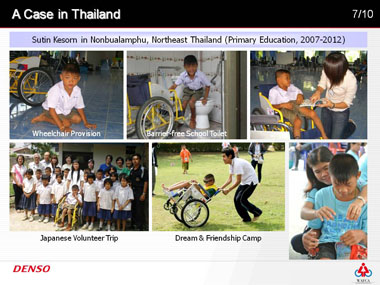 (Slide 7 text)
(Slide 7 text)
Slide 8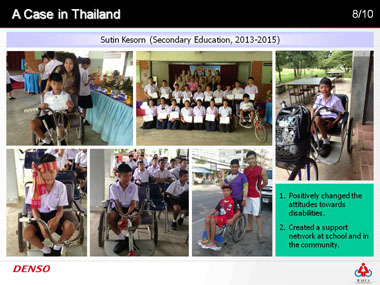 (Slide 8 text)
(Slide 8 text)
Slide 9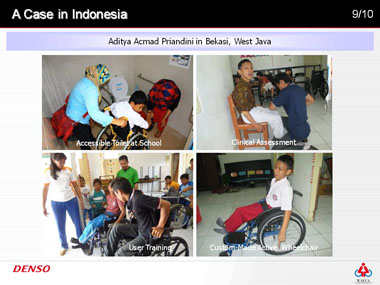 (Slide 9 text)
(Slide 9 text)
Slide 10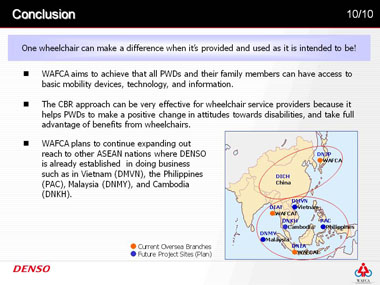 (Slide 10 text)
(Slide 10 text)
